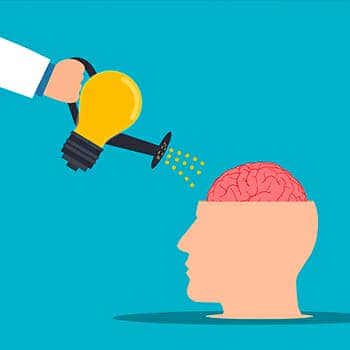Podcast: Download
Subscribe: Apple Podcasts | RSS
The world’s a challenging (and sometimes crazy) place, and that’s why everyone needs mental training.
If you’re like me, someone dealing with multiple physical and mental health issues, training your mind regularly is even more important.
That’s because it takes a particular kind of mind to show up to life, even when things are going good.
See, you either want your brain to:
- Start doing something
- Stop doing something
- Resume doing something you started but dropped
Or you have a learning situation where you just can’t get your memory to make something stick.
What will help you make the change?
Mental training. And here’s the very good news:
Many scientists have studied what it takes to keep your mind and memory strong. And I’ve personally run a number of experiments I’ll share with you on this page.
So if you’re a person who wants to enjoy a high-performance mind, you’ll love the tips and strategies you’ll find on this page.
Let’s get started!
Mental Training: The Superpower That Helps You Master Any Topic Or Skill
Mental training is defined quite simply as anything you do to keep your mind sharp, focused and helping you move towards your goals.
The main trouble with the idea of taking on various exercises is that in order to grow your mental strength, you need to choose specific exercises with a goal in mind.
To help you think of the goal you might want to pursue, here are some of the main experts in the area of mental performance.
Dr. Carol Dweck
Dr. Dweck measures mental strength in terms of mindset. She distinguishes between having a growth mindset versus a fixed mindset.
She suggests that hard work, dedication, and training will train your mind on their own.
However, this suggestion may not suit you. Many things involve several learning stages, and you may need to put some thought into where exactly you start. Diving straight into learning new skills without knowing where to begin can sometimes wind up unnecessarily frustrating you.
Still, her book Mindset does contain some powerful suggestions, such as giving yourself a kind of cognitive behavioral therapy. If you get frustrated, she advises you not to call yourself stupid. Rather, she advocates replacing negative thoughts with positive ones.
I can agree because I used to ridicule myself a lot until I learned to ask the self inquiry questions I shared in this TEDx Talk. Since learning how to stop filling my brain with so much mental noise, my concentration is so much better. You also can boost your concentration quickly if you wish.
Dr. Anders Ericsson
Some people attribute Dr. Ericsson with developing the concept of deliberate practice. Although he may have coined that term, musicians have been using this form of practice for centuries.
Nonetheless, he scientifically demonstrated how focus on specific goals combined with targeted feedback can lead you to mastery in any given field.
And he’s definitely right that you need continuous practice and some form of journaling to provide feedback if you want to achieve peak performance. As memory champion Johannes Mallow has shared, journaling has been a key part of how he trained his mind to improve as a memory athlete over the years.
Dr. Richard Davidson
Dr. Davidson has conducted impressive research on the brain to teach us about how it is affected by meditation and mindfulness practices.
Similar to Dr. Dweck, he has found that simply starting the practice is a good unto itself. Meditation often makes more meditation easy to perform because of how it increases well-being and resilience. After a short while, you don’t have to force yourself to do it. You simply find yourself attracted to doing it.
I’ve reported similar experiences in The Victorious Mind and shared more substantial concentration meditations you can try.
Dr. Martin Seligman
Dr. Seligman has studied both the bright and dark sides of mental training.
For example, he studied learned helplessness. Before I used mental training to heal my problem with high places, I literally went out of my way to train my friends to help me steer clear of bridges.
It wasn’t until I learned of his work that I was able to use mental training in a better direction. I’ve used concepts he’s talked about like learned optimism to cultivate a more positive attitude and enjoy more resilience in the face of challenges.
Dr. Angela Duckworth
Dr. Duckworth talks about the concept of grit. It’s definitely something we can all use, especially those of us who need perseverance and passion in order to achieve our long-term goals.
Dr. Duckworth has suggested that grit is a better predictor of success than IQ, inborn talent or any level of natural skill or ability.
Like Dr. Dweck, a theme of developing grit through hard work, resilience, and a growth mindset run throughout her work.
7 Mental Training Exercises to Unlock Your Mind’s Potential
Although I’ve learned a ton from each of the experts listed above, some of the books they’ve written are for the popular market and heavily shaped by traditional publishers.
That means they tend to stick to the easy techniques and use the books as long “sales letters” to expensive training programs or software packages.
How about some more substantial mental training exercises? Ones that won’t cost you a dime?
Before we get started, this point is important:
Please understand that if you don’t put these suggestions into action, no mental training will take place. Each person has to pick up the tools and put them into motion, so if you’re depressed or suffering brain fog, you may need to weed out any foods that harm your brain from your diet first.
Seriously. All the training routines in the world will do very little for your mind if your brain is sick.
With that in mind, here are some of my favorite brain training routines that directly tackle the strength of your mind.
One: Brain Exercise
There are many ways to exercise your brain. For example, you can:
- Practice memory-related brain exercises
- Play memory games
- Play brain games especially designed for adults
- Ask philosophical questions
- Develop your critical thinking skills
- Learn to change your physical brain through neuroplasticity
- Engage in daily brain warm up exercises
- Play chess and memorize the major openings
There are many other brain exercises that will provide mental stimulation. But these all go directly to the mind itself.
Two: Memory-Based Meditation
We’ve talked about meditation already, but let’s kick things up a notch.
Memory-based meditation involves memorizing long form content, like personal mantras.
At the moment, I’m personally memorizing the Lojong phrases to create more mental peace. Many of them are also great reminders to keep practicing and how to think about the nature of real practice.
For example, one of the Lojong says, “If you can practice even when distracted, you are well-trained.”
That’s the ideal I strive for, and memory-based meditation is the finest path I know for crafting a mind that remembers to practice for the goal of avoiding distraction.
These practices are also useful for improving negative attitudes, something I certainly needed at one point in my life.
Three: Develop Your Vocabulary
Huh? What does memorizing vocabulary have to do with mental training?
A lot.
For one thing, having a bigger vocabulary helps you read faster.
It will also serve as a learning project that helps you develop some of the grit discussed by Dr. Duckworth.
Four: Read Something Challenging For At Least 30 Minutes Daily
A lot of people weaken their minds and create digital amnesia by endlessly scrolling through social media online.
Make no mistake:
Just about everything you see online is designed to be lightweight and not exercise your mind. In fact, it’s a kind of rote learning that has been shown to reduce critical thinking.
But carrying a physical book, whether it’s a novel or a non-fiction study of something you’re interested in, you’ll get much more mental exercise.
Don’t worry if you don’t understand everything. I personally go out of my way to choose books I don’t understand. Challenge is the only way to get the mental fitness I seek, so I go out of my way to find it and you should consider doing so too.
If you struggle to get started, or can’t focus, try these focus for reading tips.
Five: Yoga
Did you know that yoga can improve your concentration? It gives you memory boosts too, which you can increase by memorizing the terms related to the practice.
Even though it’s technically not dopamine fasting, yoga does provide a great way to give yourself a break from the dopamine spikes created by too much time spent online.
Six: Practice Multiple Mentality
One of the hardest courses I ever completed is Harry Kahne’s Multiple Mentality. I first heard of him from performer and magic historian, Ricky Jay in his book Learned Pigs & Fireproof Women. (How’s that for a strange and intriguing title?)
The basic idea is that you play various games with the alphabet in your mind, such as learning to recite it backward.
It sounds silly, but it’s quite a challenge and provides a lot of focus and clarity.
From there, you can learn to write backward, or develop something like ambidextrousness. For some other exercises related to these powerful challenges, check out neurobics.
Seven: Memory Training
The most direct and powerful mental training involves committing information to memory using memory techniques.
One of the most effective is the ancient memory technique called the Memory Palace.
To master this form of memory training, I invite you to check out these Memory Palace examples so you can start training. Next, get my free memory improvement course:
It will teach you the Memory Palace technique and give you several exercise that will train multiple aspects of your mind.
Mental Training Is The Challenge We All Need
Now that you have a bunch of mental training routines you can follow, what do you say?
Are you ready to put them into action?
I hope so. The world needs more people who seek out the path to owning a finer mind.
So I compliment you on joining us and can’t wait to hear how things go for you as you train your brain for total success!
Related Posts
- Delayed Gratification Tips For Memory Training With Matt Dobschuetz
If you don't have strategies for delaying gratification, you're robbing from your memory training efforts.…
- 3 Effective Brain Training Exercises for Mental Illness Sufferers
Brain training exercises are for everyone, including those suffering from mental illness. Discover the best…
- MMMP 009: Memory Training Consumer Awareness Guide
Here's an audio presentation of The Magnetic Memory Method "Memory Training Consumer Awareness Guide."










2 Responses
Hey Anthony,
I suck at memorizing facts. With GRIT I became a good engineer. Now I mostly walk past facts and things where I can and focus on processes in most facets of life. At age 55 I am a natural with emptiness of thought and show up to Life mostly as a wide-eyed human onion enjoying all my human layers engaging with other human onions like you. :-). I am glad you got to experience the exquisite stillness as well. As a Science of Mind and Qui Gong practitioner I use the power of a quiet mind to align with absolutes such as Self, Oneness and Flow, aka Life and Love to co-create with something larger than myself (Spirit, Noosphere, who knows?) by imprinting upon it from my mental neutral space with premeditated intentions of myself and others. In my experience it is this type affirmative prayer used by Ernest Holmes about 100y ago that shapes outcomes. Having played with that for a while I admit that I selfishly use my mind like a well-trained dog: It sits at heal and regards. Then, I tell it to go fetch when I seek direction, clarity, healing or want fulfillment to meet my desires. Life is great. Hope to learn the Crystal Palace technique some time. Sounds like the richer the associations the better the results. I’m not sure I am a good candidate not following much of the exciting cultural phenomena and thus having few “hooks” in my stiller mind. What do you think?
Thanks so much for this comment, Misha.
It sounds like you’re in a great place and wonderful that you put grit to work for you.
In terms of moving forward and learning to use Memory Palaces and the like, I’m confident you can do it. Generally, this skill doesn’t take much grit to learn, but since you’ve got it, apply wherever and whenever needed.
Does this way of looking at things make sense and help you out?